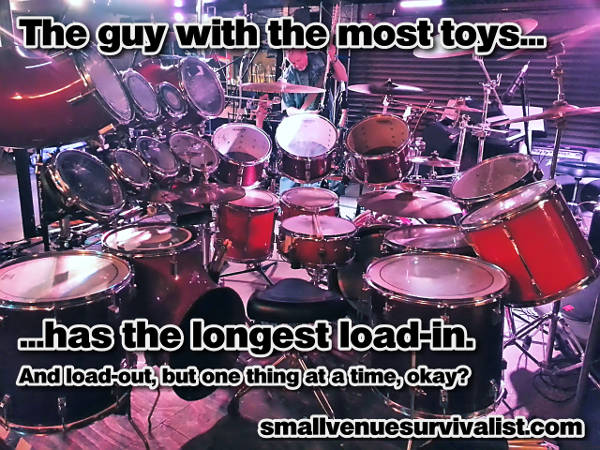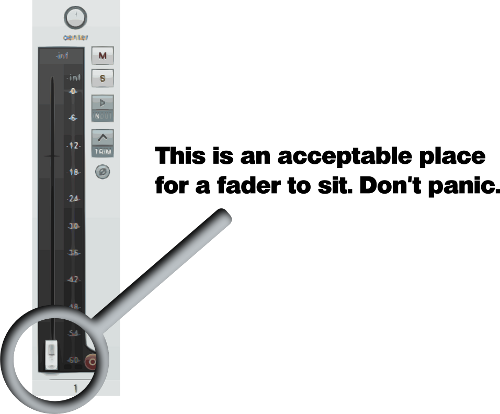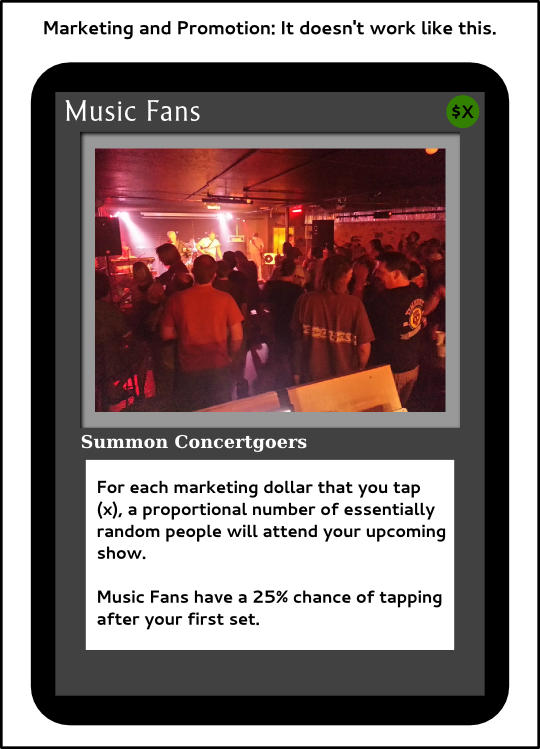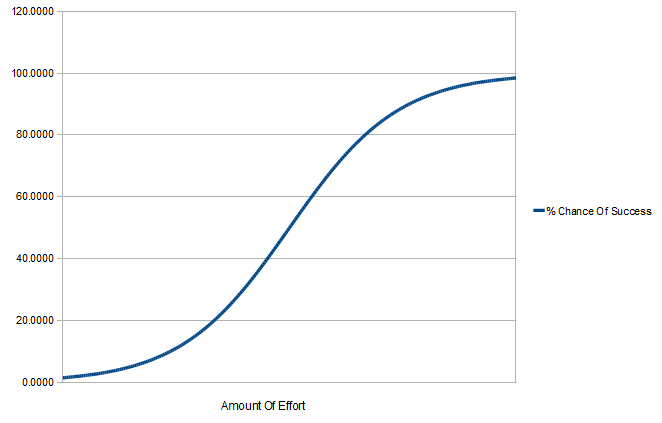If you live in the United States, you may have noticed an emergent cultural phenomenon over the last decade or so. I don’t doubt that it’s always been present to some degree, but the present drama of “argumentative schoolchildren masquerading as political parties” seems to have amplified this particular signal out of the noisefloor. The concept in question is work or effort as the prime comparator between the worthiness of people/ things/ ideas/ economic systems/ whatever.
Seriously, think about it.
How many times, over the last few years, have you heard someone justify something in terms of work? How many times have you heard people try to legitimize their point of view, or get a perceived argumentative advantage over someone else, by invoking how much work they do?
“If they just worked harder, they’d be the leaders of these companies.”
“I went to school full time, and had two jobs. I didn’t need any help from anybody.”
“They should get jobs instead of protesting.”
“In my day, any job was a golden opportunity.”
“I should have [something], because I was in the Marines.”
“I should have [something], because I went to college.”
“Over here, we know the meaning of work. Not like those folks over there.”
If you were paying attention to the last election at all, you heard this theme over and over and over and over and over and over (I got one more!) and over again.
This whole thing has been a part of the music business for a long time, too. It’s just that, lately, it seems to be resonating with the overall social signal. It’s more noticeable, as a result. I know you’ve seen the memes:
“Rock: Playing three chords to 10,000 people. Jazz: Playing 10,000 chords to three people.”
“10,000 hours of practice. $10,000 of gear. 2 hour drive to the gig. And you think that [some number of dollars] is too much to pay for musicians?”
“This simplistic pop-princess song had sixteen writers and ten producers. It’s not nearly as good as this symphonic classic-rock song that had one writer and one producer.”
All these notions are rooted in some kind of truth. They wouldn’t be funny/ tragic/ annoying/ etc. if they weren’t. Here’s the thing, though.
The “I work harder than you” comparison is a pox on the music business. (I was going to say that “it’s wrecking the music business,” but that struck me as overstatement.) This schoolyard pissing match of who is putting in more hours, knowing more, studying more, practicing more, moving more gear, and just generally getting more tired? It’s creating bitter people, cracking bands apart, and creating tribal conflict amongst larger groups who need to be friends to thrive.
Fair warning: In this article, I’m going to start by discouraging the hell out of you – but then I’m going to try to find the silver lining. All I ask is that you hear me out. (Or you can just scroll down to the end. Ignore all the work I put into this article. It’s cool. IRONY!)
No Warranty Available
Effort has value. This is intuitive, right? If a musician has to learn how to play a G Mixolydian scale, they are going to have to expend some non-zero amount of effort to make that happen. If a tech has to get a couple of subwoofers into a venue, they’re going to have to do some work to get the boxes in the room.
Makes sense.
Effort and work correlate with getting results you desire. If you do nothing, the likelihood of a favorable outcome drops like a rock. If you put effort into something, the likelihood of a favorable outcome goes up. Steeply, even.
…but there’s a strange, uncanny, maybe even nasty little phenomenon that our “work is the measure of all things” society doesn’t like to talk about:
The drop towards zero likelihood of success and the climb to 100% certainty are asymptotic. In other words, even with zero effort, the “certainty of outcome” doesn’t actually hit zero. On the flipside, a massive amount of work and toil can’t actually guarantee that things will go your way. It’s an “S” curve.
There is no warranty offered on your music business experience. There are folks who can play the wackiest scales, at high speed, after going through them twice. There are other players who, if they spent the rest of their lives practicing, just wouldn’t be able to get their fingers around it. There are people who can pinpoint feedback frequencies intuitively, within a third of an octave or less. There are people who just don’t seem to be able to, even after years of experience.
Life is like that.
There’s also no warranty offered that states that “What you spend all your time working on will be what people are willing to pay for in your market.” You may have learned a million, billion chords. You might have spent decades doing it. You might be THE top, prog-jazz-alt-country-screamo-mathrock-crossover player in the whole universe…but if nobody around wants to pay to hear that, then your effort is lost on the local market.
Effort isn’t currency that buys desired outcomes. If it was, everybody who got past a certain, quantifiable amount of work would get the outcome they wanted. Again – hard work influences the possibility of success, but it doesn’t guarantee it.
This is where bitterness and tribalism come in.
We Work Harder, So We’re Better
Humans – at least in my experience – have a natural tendency to form tribes. Tribes can form around almost anything: Musical taste, fashion sense, geographic area, occupation, one TV show or another, Fords vs. Chevys, Shure vs. Sennheiser vs. Audix vs. EV…whatever. Take your pick. People have an emotional need to belong to a community (whether of large or small scale), and we also tend to have a better chance of thriving when we can provide each other with mutual support and defense. There’s nothing inherently wrong with tribes.
Humans also, however, have a tendency to fear “the other,” and when things don’t go our way, it’s very convenient to blame “the other” for our troubles. We also like to view “the other” as lesser than we are. This is where tribalism comes in. We start to say “my people above all other people, especially those dirty, criminally-minded jerks from [wherever]” as opposed to “these are my people, and those are different people over there, and those people wear clothing with a different pattern which is good for them but not really my taste. Also, some of their food is really good, although I don’t like potatoes as much as they do.”
There’s a big difference in these attitudes.
Because we’ve gotten into this habit of using work or effort as a means of measuring the worth of a person, what we’ve also gotten ahold of is a very convenient “weapon” for determining if other people are beneath us or not. If we perceive that someone else isn’t working as hard as we are, and yet has more of what we want, we get this nice, easy out – we just call them lazy, pat ourselves on the back as good-guys, and feel better. Sort of.
Actually, the tendency is to become bitter.
Because we culturally assume that our work is a guaranteed currency that buys success, we get really pissed off when somebody else’s currency seems to buy a lot more than ours. The ironic thing about this is that our being pissed off doesn’t hurt “the other” much at all, but it messes US up in a big way.
We get angry.
We think we’re being cheated all the time, because we’re “not being paid for how hard we’ve worked.”
We don’t think that “those people” should get any help, because “they haven’t earned it like we have.”
We make our own greedy and grasping little micro and macro tribes of “the worthy who have worked hard enough,” where “enough” is an essentially arbitrary standard that we’ve created. Those other folks are talentless fools with deep pockets. Or lazy and lucky. They don’t DESERVE it, in other words.
Sound familiar? It probably does, because the music industry has this sort of thing written all over it. The music biz is especially vulnerable to these issues, because the product of any entertainment production venture is subject to demand that is taste driven. Something can be hot for a year, and then fizzle.
…and in a market that’s heavily influenced by taste, effort doesn’t always yield proportional returns. I’d wager a guess that, in entertainment, to a degree greater than almost any other business, effort is an expenditure with uncertain results. There are lots of people who tried as hard they could, and still didn’t manage to get where they wanted to go. This creates a lot of internal bitterness. It also creates a lot of rifts between people, and these rifts actually make the situation worse. People who should be forming mutually supportive tribes end up glaring at each other with their arms crossed.
Here’s where the good news comes in.
Letting Go Of Our (Supposed) Superiority
I don’t believe that the music business needs “saving.” That is to say, the music business will always be around, because people will always make music. Humans can’t seem to help themselves. We sing, dance, create rhythms, and just generally amuse ourselves to no end by making organized noises.
I do believe, though, that we can make the music industry that we’ve got right now into a better place to inhabit. I also believe that a big piece of making it a better place is to spend less time figuring out who deserves what outcome more than anyone else.
I’d say that what we are is lucky to varying degrees.
Luck, of course, means different things to different people. Some folks view luck as an impersonal and random force. I view luck as a synonym for Providence, which is a personal and not random at all ordering of events. Nevertheless, what we are is lucky to one degree or another.
This isn’t to say that luck is the only force in effect. We participate in our luck by expending effort in one direction or another. However, if work is as I think it is – not a guaranteed currency – then it doesn’t have the final say. If the amount of effort expended on something doesn’t have the final say, then there’s no point in having a pissing match about it. If we can be honest about when we’re lucky, especially in the sublime case of having good luck that we did no work for at all (the best kind of luck), then the whole “I’m better than you because I work harder” thing loses steam.
When the “Us Vs. Them” superiority crap goes away, then the real opportunities start to come in full force. What ends up being built is an upward spiral:
- The work becomes part of the reward. When effort stops being seen as just a less-abstract way of buying success, you can start to see it as a necessary and enjoyable part of the actual journey.
- When the work becomes part of the reward, we can all stop being so “grasping” about getting every billable hour out of everything we do. We can start being much more okay with the fact that we can’t always charge somebody else for all our effort, especially if everybody (and I do mean everybody) is in the same boat.
- If we’re all in the same boat, then tribalism can take a hike. A given music scene stops looking like a bunch of warring city-states, and starts to look like a real, mutually supportive community. This happens naturally, by the way, without a ton of organization and management.
- With a mutually beneficial community, the people that have “made it” can now turn around and support the people that are still developing. When the attitude towards effort changes from “We earned this by ourselves” to “We took this road and we happened to end up here,” then giving other people a hand up doesn’t cost anything. In fact, it’s advantageous. As individual members of a mutually beneficial community become better situated, the entire community becomes more visible, more resilient, and the quality of its craft goes up.
To paraphrase the theme from an episode of “Mad About You,” if what we spend all our time on is figuring out who’s put in more hours, and who’s suffered more, and who “deserves it,” then what we have is a scoreboard instead of a community. It’s tough to let go of our pride. I certainly don’t do it naturally.
But maybe it’s worth a shot?









